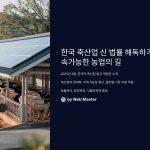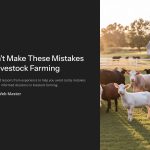 In April 2025, South Korea introduced significant amendments to its livestock industry legislation, aiming to modernize practices, enhance sustainability, and align with global standards. These changes reflect a growing emphasis on animal welfare, environmental protection, and food safety. Farmers and stakeholders must understand these updates to adapt effectively and capitalize on new opportunities.
In April 2025, South Korea introduced significant amendments to its livestock industry legislation, aiming to modernize practices, enhance sustainability, and align with global standards. These changes reflect a growing emphasis on animal welfare, environmental protection, and food safety. Farmers and stakeholders must understand these updates to adapt effectively and capitalize on new opportunities.

Overview of the New Livestock Legislation
The revised legislation encompasses several key areas:
- Animal Welfare Enhancements: Stricter regulations on housing, feeding, and handling practices to ensure humane treatment of livestock.
- Environmental Safeguards: Implementation of measures to reduce greenhouse gas emissions and manage waste more effectively.
- Food Safety Protocols: Introduction of comprehensive tracking systems from farm to table to ensure product integrity.
- Support for Sustainable Practices: Incentives for farmers adopting eco-friendly technologies and methods.
These changes aim to position South Korea’s livestock industry as a leader in sustainable and ethical farming practices.

Implications for Farmers and Industry Stakeholders
The new legislation presents both challenges and opportunities:
- Compliance Requirements: Farmers must adapt to new standards, which may involve infrastructure upgrades and training.
- Market Access: Adherence to international standards can open up export opportunities.
- Financial Incentives: Government subsidies and support programs are available for those implementing sustainable practices.
- Consumer Trust: Enhanced food safety measures can increase consumer confidence and demand.
Stakeholders should proactively engage with these changes to remain competitive and compliant.

Strategies for Effective Implementation
To navigate the new regulations successfully:
- Education and Training: Participate in government-sponsored workshops and training programs.
- Infrastructure Investment: Upgrade facilities to meet new animal welfare and environmental standards.
- Technology Adoption: Utilize modern technologies for waste management, tracking, and monitoring.
- Collaboration: Engage with industry associations and cooperatives for shared resources and knowledge.
By adopting these strategies, farmers can ensure compliance and enhance their operations.

Global Context and Comparisons
South Korea’s legislative changes align with global trends:
- European Union: The EU’s Green Deal emphasizes sustainable agriculture and animal welfare.
- United States: The USDA promotes organic and humane farming practices.
- Australia: Initiatives focus on reducing environmental impact and improving animal welfare.
Understanding these global movements can help South Korean stakeholders anticipate future developments and opportunities.

Future Outlook and Opportunities
Looking ahead:
- Innovation: Continued development of sustainable farming technologies.
- Export Growth: Potential for increased exports due to higher standards.
- Consumer Trends: Rising demand for ethically produced and environmentally friendly products.
- Policy Evolution: Ongoing legislative updates to further enhance the industry.
Staying informed and adaptable will be key to leveraging these opportunities.

Frequently Asked Questions
Q: What are the penalties for non-compliance?
A: Penalties may include fines, suspension of operations, or revocation of licenses.
Q: Are there financial supports available?
A: Yes, various subsidies and grants are offered for compliance and sustainable practices.
Q: How can I stay updated on future changes?
A: Regularly consult official government websites and industry associations for updates.
Q: Is there assistance for small-scale farmers?
A: Specific programs are designed to support small and medium-sized enterprises in the transition.
Q: Where can I find training programs?
A: Trainlivestock legislationing information is available through the Ministry of Agriculture and local agricultural offices.
*Capturing unauthorized images is prohibited*




